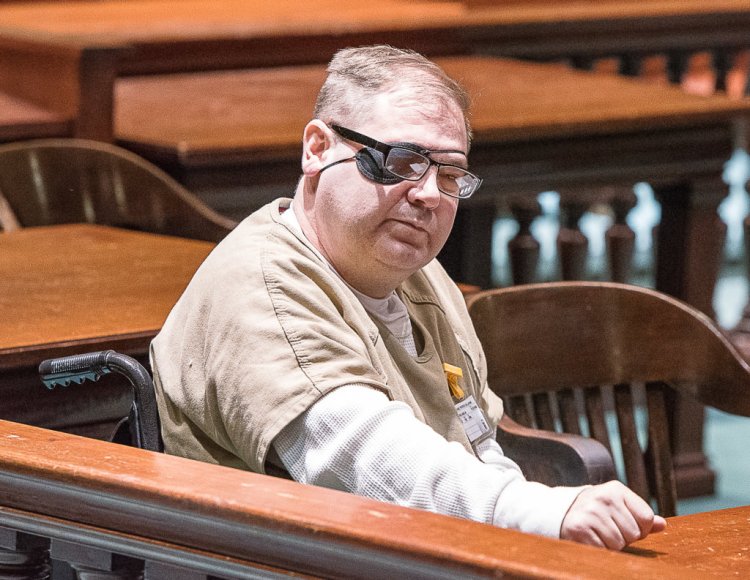AUBURN — A Minot man who went on a rampage four years ago, setting fire to his family’s home and that of his estranged wife is hoping for a new trial, claiming his constitutional rights were violated in the judicial process that landed him in prison for more than a decade.
Michael Callahan, 49, who later moved to Auburn, had also rammed his estranged wife’s minivan with his truck and tried to run down a law enforcement officer.
After pleading guilty to some of the charges stemming from the May 2013 events, a judge sentenced Callahan to three sentences of: 20 years with all but eight years suspended, plus four years of probation; 10 years, all suspended, plus four years of probation; and five years, all suspended, plus four years of probation.
The sentences were all consecutive to each other and resulted in the defendant being on probation for 12 years after getting out of prison.
The first sentence was on an arson charge for setting fire to Callahan’s ex-wife’s mobile home in Mechanic Falls. The next arson sentence was for burning down his family’s home in Minot on the same day. The final sentence was on an additional arson charge.
On six other felonies, including aggravated assault and reckless conduct, he was sentenced to five-year terms for each, all concurrent with the first arson charge. An attempted murder charge was dismissed by prosecutors.
In his January 2016 amended petition for post-conviction review, Callahan claimed ineffective assistance of counsel. Specifically, he claimed his trial attorney, James Howaniec, failed to adequately advise him about available legal defenses and the risks and benefits of going to trial.
Callahan wrote in his petition that Howaniec hadn’t fully explored efforts to suppress evidence that might be used against him at trial.
Callahan also claimed in his petition that his “substantially compromised” mental state rendered him unable to freely decide on a plea agreement.
Callahan testified Wednesday in Androscoggin County Superior Court that the sentence he ended up getting at his felony plea hearing was different from what he had expected. He also said he had wanted to take his case to trial, but had been “pressured” by Howaniec into agreeing to a plea.
Howaniec, who testified Wednesday at Callahan’s post-conviction review hearing, offered a differing account of his interaction with his former client.
Howaniec said he had proposed taking Callahan’s case to trial where he had planned to mount a defense that focused on Callahan’s compromised mental state due to his mental and physical illnesses, side effects from medications and the stress of a pending divorce, among other factors.
Howaniec, who has practiced criminal defense for more than 30 years, said Wednesday he had consulted with psychologists and psychiatrists in an effort to build a case at trial for possible “abnormal condition of mind” and “insanity” defenses.
He and Callahan had “many, many” discussions about that, Howaniec said, including possible outcomes using those defenses. An MRI had shown lesions on the frontal lobe of Callahan’s brain, the part of the brain that controls cognitive function.
Few of the facts in the case were in dispute, he said, and they weren’t favorable to the defense.
Howaniec said a plea offer from prosecutors had been “unreasonable” because it had been “just too high.”
“I was enthusiastic about taking this case to trial,” Howaniec said Wednesday. But Callahan’s mother and father had urged him to take a plea offer, Howaniec said.
Callahan said Wednesday his mother had told him she wanted to see him again while she was alive.
Howaniec said, “in one sense,” he had been “disappointed” that Callahan hadn’t wanted to go to trial.
Callahan, who uses a wheelchair because of complications from multiple sclerosis, said Wednesday that Howaniec had told him, “This is what you’re going to get” for a plea deal and that the “judge is going to smoke you” if the case goes to trial.
Howaniec said Wednesday that a judge had told him and Callahan during a pretrial settlement conference that he would have sentenced Callahan to 18 years in prison, based on the facts of the case.
Callahan said Wednesday he was “devastated” following his 2014 sentencing and hadn’t been satisfied with Howaniec’s representation. He said he’d thought he would receive six years of probation, not the 12 years that he was given.
District Attorney Andrew Robinson pointed out Wednesday that Callahan had kept Howaniec on as his attorney for more than a year following that plea.
Callahan said he had been led to believe by Donald Hornblower, Howaniec’s co-counsel in the case, that they would likely be going to trial but that potential defenses were never discussed with him.
Wednesday’s hearing is expected to be continued in January.
Copy the Story LinkSend questions/comments to the editors.



Success. Please wait for the page to reload. If the page does not reload within 5 seconds, please refresh the page.
Enter your email and password to access comments.
Hi, to comment on stories you must . This profile is in addition to your subscription and website login.
Already have a commenting profile? .
Invalid username/password.
Please check your email to confirm and complete your registration.
Only subscribers are eligible to post comments. Please subscribe or login first for digital access. Here’s why.
Use the form below to reset your password. When you've submitted your account email, we will send an email with a reset code.